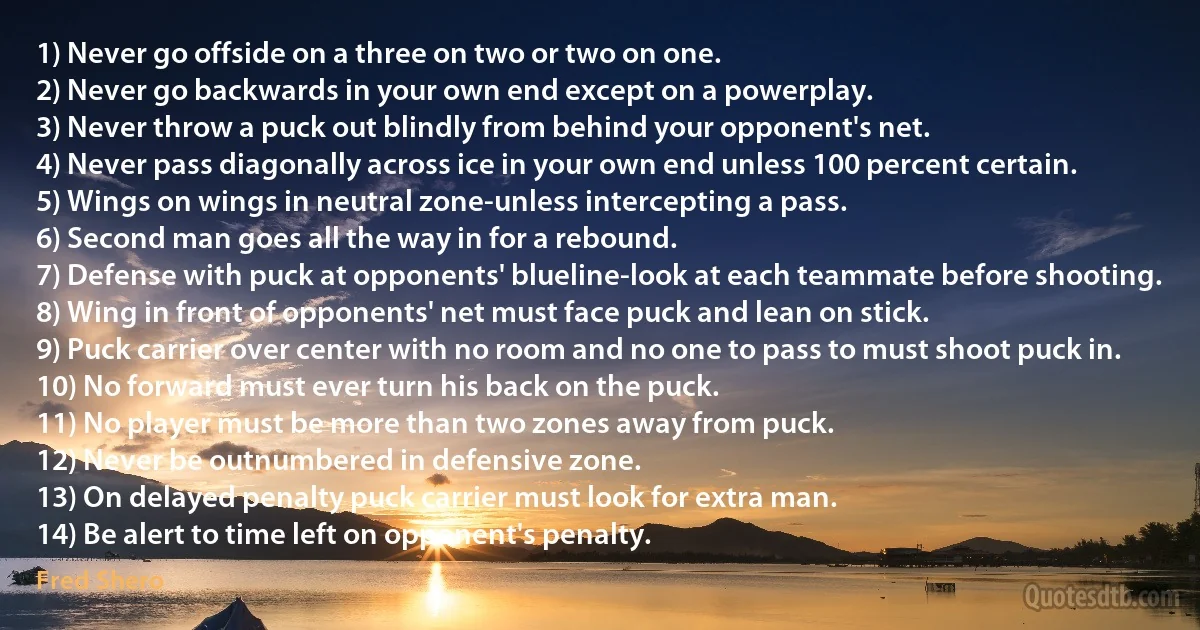
1) Never go offside on a three on two or two on one. 2) Never go backwards in your own end except on a powerplay. 3) Never throw a puck out blindly from behind your opponent's net. 4) Never pass diagonally across ice in your own end unless 100 percent certain. 5) Wings on wings in neutral zone-unless intercepting a pass. 6) Second man goes all the way in for a rebound. 7) Defense with puck at opponents' blueline-look at each teammate before shooting. 8) Wing in front of opponents' net must face puck and lean on stick. 9) Puck carrier over center with no room and no one to pass to must shoot puck in. 10) No forward must ever turn his back on the puck. 11) No player must be more than two zones away from puck. 12) Never be outnumbered in defensive zone. 13) On delayed penalty puck carrier must look for extra man. 14) Be alert to time left on opponent's penalty.
Fred SheroRelated topics
across behind certain defensive end face forward front ice lean left man net pass puck rebound room second shoot shooting stick three throw time turn way wing zone 100 wings teammateRelated quotes
[On the attendees at the launch of Apollo 11] Those people were not a stampeding herd, nor a manipulated mob; they did not wreck the Florida communities, they did not devastate the countryside, they did not throw themselves, like whining thugs, at the mercy of their victims - they did not create any victims. They came as responsible individuals able to project the reality of two or three days ahead, and to provide for their own needs. There were people of every age, creed, color, educational level and economic status. They lived and slept in tents, or in their cars, some for several days, in great discomfort and unbearable heat; they did it gamely, cheerfully, gaily; they projected a general feeling of confident goodwill, the bond of a common enthusiasm; they created a public spectacle of responsible privacy - and they departed as they had come, without benefit of press agents.

Ayn Rand
Spontaneous social action will be broken up over and over again by State intervention; no new seed will be able to fructify. Society will have to live for the State, man for the governmental machine. And as, after all, it is only a machine whose existence and maintenance depend on the vital supports around it, the State, after sucking out the very marrow of society, will be left bloodless, a skeleton, dead with that rusty death of machinery, more gruesome than the death of a living organism. Such was the lamentable fate of ancient civilisation. ... Already in the times of the Antonines (IInd Century), the State overbears society with its anti-vital supremacy. Society begins to be enslaved, to be unable to live except in the service of the State. The whole of life is bureaucratised. What results? The bureaucratisation of life brings about its absolute decay in all orders.

José Ortega y Gasset
Were we required to characterise this age of ours by any single epithet, we should be tempted to call it, not an Heroical, Devotional, Philosophical, or Moral Age, but, above all others, the Mechanical Age. It is the Age of Machinery, in every outward and inward sense of that word; the age which, with its whole undivided might, forwards, teaches and practises the great art of adapting means to ends. Nothing is now done directly, or by hand; all is by rule and calculated contrivance. For the simplest operation, some helps and accompaniments, some cunning abbreviating process is in readiness. Our old modes of exertion are all discredited, and thrown aside. On every hand, the living artisan is driven from his workshop, to make room for a speedier, inanimate one. The shuttle drops from the fingers of the weaver, and falls into iron fingers that ply it faster.

Thomas Carlyle
I am sure that a definite limit exists to the degree of equality which is desirable. We do not want complete equality of incomes, since extra responsibility and exceptional talent require and deserve a differential reward. We are not hostile, as our opponents sometimes foolishly suggest, to 'detached residences in Bournemouth where some elderly woman has obviously more than a thousand a year'. I do not myself want to see all private education disappear; nor the Prime Minister denied an official car, as in one Scandinavian country; nor the Queen riding a bicycle; nor the House of Lords instantly abolished; nor the manufacture of Rolls-Royces banned; nor the Brigade of Guards, nor Oxford and Cambridge, nor Boodle's nor (more doubtfully) the Royal Yacht Squadron, nor even, on a rather lower level, the Milroy Room, lose their present distinctive character; nor anything so dull and colourless as this.

Anthony Crosland
The intervening time to my first inauguration was filled up with wranglings between Congress and the new Executive as to the best mode of "reconstruction," or, to speak plainly, as to whether the control of the Government should be thrown immediately into the hands of those who had so recently and persistently tried to destroy it, or whether the victors should continue to have an equal voice with them in this control. Reconstruction, as finally agreed upon, means this and only this, except that the late slave was enfranchised, giving an increase, as was supposed, to the Union-loving and Union-supporting votes. If free in the full sense of the word, they would not disappoint this expectation. Hence at the beginning of my first Administration the work of reconstruction, much embarrassed by the long delay, virtually commenced. It was the work of the legislative branch of the Government.

Ulysses S. Grant
